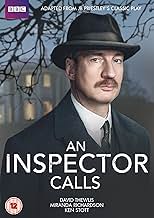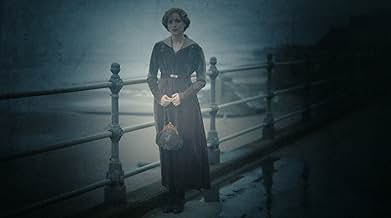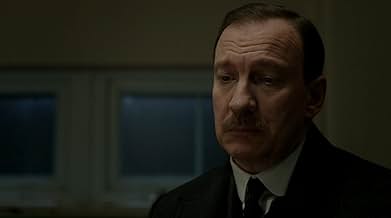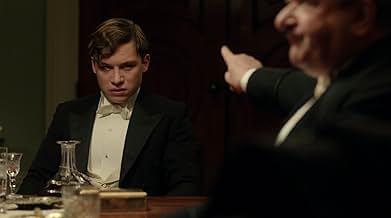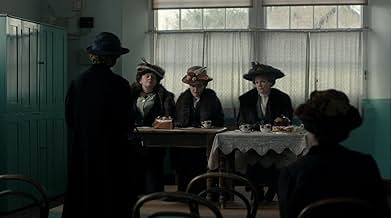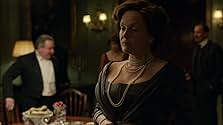Agrega una trama en tu idiomaA mysterious inspector investigates the wealthy Birling family and their dinner guest following the suicide of a young woman.A mysterious inspector investigates the wealthy Birling family and their dinner guest following the suicide of a young woman.A mysterious inspector investigates the wealthy Birling family and their dinner guest following the suicide of a young woman.
- Dirección
- Guionistas
- Elenco
- Premios
- 2 premios ganados y 5 nominaciones en total
- Gate Keeper
- (sin créditos)
- Posh Lady
- (sin créditos)
- Millward's Shop Customer
- (sin créditos)
- Young Eva
- (sin créditos)
- …
- Factory Worker
- (sin créditos)
- …
- seaside Photographer
- (sin créditos)
- Factory Worker
- (sin créditos)
- Dirección
- Guionistas
- Todo el elenco y el equipo
- Producción, taquilla y más en IMDbPro
Opiniones destacadas
Eva Smith does not appear in the Priestley text; in this version she is transformed into a hard-working girl who is not backward about coming forward. Hence she becomes an object of affection for factory-owner Arthur Birling (Ken Stott), his son Eric (Finn Cole), and Gerald Croft (Kyle Soller), the son of a rival factory-owner who is due to be affianced to Arthur's daughter Sheila (Chloe Pirrie). Yet it soon becomes clear that all of them treat her as an object to be picked up and cast aside at will; it's a tribute to Eva's strength of character that she manages to sustain her integrity throughout, until she gives up the ghost and commits suicide.
At the end of the film the floorboards shot is explained, as Eva describes herself as "a crack in the floorboards" - a member of the underclass who is allowed to fall through in a crassly unequal society. No one, it seems, is willing to treat her on her own terms as a human being.
Walsh's version also represents the Inspector (David Thewlis) as a mysterious figure moving slowly in the darkness towards the Birling residence, walking along a narrow slum in shadow, his bowler hat and long coat silhouetted, and visiting the dying Eva in hospital. We are left unsure as to whether he exists at all - especially at the end when he mysteriously disappears. But the question of his being isn't really important: what matters more is his ability to uncover the truth about the Birling family through patient, insistent questioning. Thewlis's expression remains impassive throughout - even if he despises the Birlings' superciliousness, he will never let his emotions get the better of him.
In the central moments of the drama, as the truth about the family was gradually revealed, Walsh used repeated close-ups to focus on the protagonists' changing expressions: Arthur's look of quiet confidence was transformed into an expression of utter despair as he ran his hands through his hair; his wife Sheila (Miranda Richardson) tried her best to retain an impassive exterior, but the tell-tale movements of her cheek and neck-bones betrayed her emotions. Her stoicism in the face of the inevitable truth-revelation was contrasted with Eric's expressions - at first he looked guiltily at everyone in full knowledge that he had been in some way responsible for Eva's death, but as the drama unfolded he acquired a strength of character as he tried to come to terms with his past.
Brilliantly performed and suggestively directed; this was a thoroughly televisual version of the play that reminded us of the persistence of social inequalities today.
To be honest, right at the beginning when the characters were presenting themselves at the dinner table I found most of their portrayals quite bland and out of character in a sense- especially Eric and Sheila. I found them lacking that strength and uniqueness that had made me strive for them while reading the play, but then again it's true that at the beginning their personalities were much more superficial and that were mostly developed as the play progressed- something which was shown naturally in the film.
Nevertheless, as soon as the plot starting moving the skepticism faded away and I was left awestruck by the actors' outstanding performances; Mr and Mrs Birling were just how I pictured them throughout the story; Gerald was given much more emotional depth than what I had imagined and Eric even though it wasn't how I initially thought of him made me comprehend a completely different interpretation of his character. I am not quite sure of Sheila yet, but I do have to admit that Chloe Pirrie reflected her major character development, but I imagined Sheila as a more immature and naive girl in the beginning. Let's not forget about Sophie Rundell's breathtaking job as Eva: taking only brief descriptions from a dead girl and turning that into a round character with a profound, political and representative meaning behind it.
Even if the characters' portrayals is essential to the film, what really sticks to the audience are the audiovisuals, and I can assure you this film excelled in that job. The shots were beautiful and gave the story a deeper meaning for me as a viewer and indeed hinted many subtle messages that otherwise wouldn't have made much sense. Above all, what most impressed me was the score; from the beginning until the very end the score was used skilfully to match the characters' emotions in certain scenes, but the feeling of strings and a piano matched the main themes of the play, and probably may be the main reason for my passionate liking of this film.
The play is opened up just enough so as you'd notice with some external scenes but mostly, as you'd expect it's played indoors, intensifying the drama to a backdrop of hypnotic chamber music as the plot edges inevitably to its climaxes. I say climaxes because of the two big reveals that Priestley employs, firstly exposing the hypocrisy of the staid pre-Great War English society in their links to this young woman's demise and then the brilliant twist at the end just when it seems as if they've all gotten away with it.
Some of Priestley's wider themes seem to be just that, i.e. wide of the mark, like his prediction of a bloody uprising by the downtrodden working classes, although considering the social upheaval later in the depicted decade, obviously with events abroad in Russia, Ireland and Weimar Germany to name but three, never mind the General Strike and Red Clydeside disputes of the post-War era here in Britain maybe he wasn't so far out either. It's only in the words and actions of the two youngest members of the afflicted Birlings that we see any hope of societal change in the future as we observe their conscience-stricken reaction to events, neither tainted by the jaundiced, self-motivated experience of their elders.
The treatment of the Inspector I thought played up the fantastic element just a little too much with the extended epilogue showing him as a sort of omnipresent spirit surrounding Eva as she comes to her fateful end almost as if the director felt the need to explain his unexplained presence,which for me reduced the character's effectiveness as the pricked conscience of the group, his last appearance should really have been after he finished with the family at the house.
Nevertheless, any production like this which respects the context of the original play as this one undoubtedly does, even if at times it creaked rather than crept along, still managed to entertain me just as it always has, as a taut, cleverly written, psychological thriller with a moral in the tale.
¿Sabías que…?
- TriviaThe original play was produced twice on Broadway over a 50-year period of time. The second production earned multiple awards, including Best Revival of a play, and best featured actress for Jane Adams. The revival production also earned awards for creative set design, which featured all adult actors moving around on an oversized doll house sized set, and the actors were unable to actually enter or move around within the rooms of the house.
- ErroresGerald leaves the room after Sheila has given him back her engagement ring, but the next time she appears, she still has the engagement ring on her finger.
- Citas
The Inspector: There are millions and millions of Eva Smiths and John Smiths still left with us, with their lives, their hopes and fears, their suffering and chance of happiness, all intertwined with our lives in what we think and say and do. We don't live alone upon this earth. We are members of one body. We are responsible for each other. And if mankind will not learn that lesson, then the time will, soon, when he will be taught it in fire and blood and anguish.
- ConexionesRemake of An Inspector Calls (1954)

